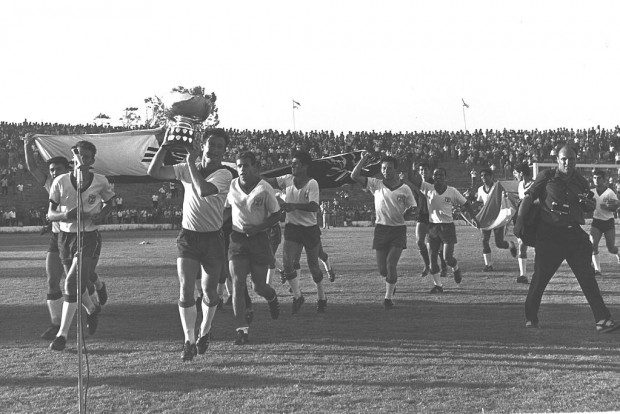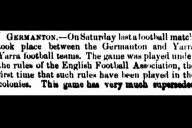There’s some scratchy black and white archival footage on YouTube of Israel playing Iran in the 1968 Asian Cup Final. The match was played in Tehran and Iran beat defending champions Israel 2-1 to win the Asian Cup.
The footage lasts for all of 42 seconds and shows Iran scoring twice and their lap of honour.
Israel had won the 1964 tournament, which it also hosted, by beating South Korea 2-1 to secure the title. Israel had been runners-up to South Korea in the two preceding Asian Cup tournaments in 1956 and 1960.
The Israeli team was a motley collection of local and foreign-born Jews: the team’s coach, Yosef Merimovich, was born in Cyprus; its young star Mordechai Spiegler was born in the Soviet Union; defender David Primo hailed from Bulgaria. It was a team that in many ways represented the hopes of a nation trying to find its place in its neighbourhood and in the world after the horrors of World War 2 and the Holocaust.
Sixty-seven years after it declared itself a nation, Israel is still trying to find its place.
Israel as Asian powerhouse
The tournament in 1968 was to be the first of three consecutive Asian Cup wins for the great Iran team of the late 1960s and early 1970s. Iran would go on to the 1978 World Cup in Argentina, knocking out Australia on the way, and representing the emerging Asian football continent with respectable losses against eventual finalists, the Netherlands, and Peru, the then reigning Copa America champions, as well as a draw against a strong Scotland team.
The Israel team which Iran beat in 1968 was not a bad side either. In fact, Israel had knocked the Socceroos out on the way to their only ever World Cup finals appearance in 1970. Possibly Israel’s greatest ever player, Mordechai Spiegler, broke the hearts of Australian fans when he scored a 78-minute goal in the second leg of the tie, putting Israel up 2-0 on aggregate before Johnny Watkiss secured a consolation goal for Australia in the 88th minute.
The Israelis did well for a team of part-timers at Brazil 70, managing a draw against one of the great Azzurri sides, which contained the likes of Giacinto Facchetti, Luigi Riva and Sandro Mazzola.
The match against Italy had a certain poignancy considering the Jewish contributions to the development of modern calcio. Among the noted contributors were Hungarian Jews such as Arpad Weisz — who became a legendary figure at Inter and died in Auschwitz in 1944 — and Erno Erbstein — who was co-manager of the great Torino side of the late 1940s and died in the Superga air crash of 1949. There was also Italian journalist and sports administrator Massimo Della Pergola, the son of a rabbi and the man who invented the weekly football betting pools known as Totocalcio which would become a standard fixture of the game in Italy.
They also lost to Uruguay 2-0 (never a disgrace) but against Sweden grabbed another point and their only goal, courtesy of Spiegler — who played the bulk of his career with Maccabi Netanya but had spells at Paris Saint-Germain and New York Cosmos.
Both Israel and Iran would figure prominently as foils to Australia’s ambitions to qualify for the World Cup finals in the long drought years from 1974 to 2006. Australia played 15 times against Israel between 1969 and 1989, including four tough-as-nails World Cup qualifiers from 1985 (for the 1986 WC) to 1989 (for the 1990 WC).
The head-to-head in those four games was a solitary 2-1 win to Australia and three 1-1 draws. The likes of defender Avi Cohen (who had a brief spell at Liverpool), mercurial midfielder Eli Ohana and the marauding Roni Rosenthal (who was also at Liverpool) always gave the bruising Socceroos team of the time as good as they got.
Israel’s wander years
Despite its geographic location in West Asia, Israel was expelled from the Asian Football Confederation in 1974 after a motion by Kuwait to expel the Jewish state was carried with a 17-13 vote, with six member nations abstaining from the vote.
The expulsion came in the wake of years of tension between Israel’s Zionist project and growing expressions of pan-Arab nationalism and solidarity with the Palestinian people. From the Six Day War in 1967, and the subsequent adoption of the Khartoum Resolution by Arab state leaders rejecting Israel’s legitimacy as a sovereign state not long after, things looked ever more grim for Israel in the region.
The ideal of sport as a means of mending fences and building bridges took a back seat to the realpolitik of sport as nationalist battleground. This was illustrated horrifically by the 1972 Munich Olympics massacre in which 11 Israeli Olympic athletes were killed by the Palestinian Black September group.
The Arab position had hardened and Israel bunkered down for a fight, which came soon enough again with the Yom Kippur/Ramadan War of 1973.
From its expulsion in 1974, the Israel national team bounced between confederations; playing against East Asian nations for the 1978 World Cup qualifiers; against European opponents for 1982; and then Oceania nations for 1986 and 1990, along with fellow misfits Australia, New Zealand and Taiwan. Israel eventually found a home in UEFA in 1992.
Erased from history
In advance of this year’s Asian Cup, the AFC released a short promo video titled History of the AFC Asian Cup: 1956-2011. The video gives a three-minute rundown of the Asian Cup finals, except it misses out totally on mentioning 1964, the year the tournament was hosted and won by Israel.
It was as if Israel had never existed. Erased from memory. Written out of history.
When questioned about the omission, an AFC spokesman told The Australian Jewish News the absence of Israel from the video was not deliberate and would be investigated.
“Israel’s history in the Asian Cup is still available in all our communications material including the Asian Cup Data Handbook, the website, collateral, etc,” the spokesman told The AJN.
“The video is something that we will look into.”
But being left out of a promotional video might be the least of Israeli football’s problems.
Though Israel is now part of UEFA, the Palestine FA has signalled it is considering lobbying FIFA to expel Israel as a member nation of the world footballing body if it does not change policies that restrict the movement of Palestinian players between Palestinian territories. The Israeli policies meant two Palestine players were unable to take part in the Asian Cup and co-ordinating players for the Palestinian FA is a permanent nightmare.
The reality is that Israel is unlikely to be expelled from FIFA, but pressure from the Palestinians, their supporters, and some subtle leaning from fellow UEFA members might see Israel have to bend its policies to become a little more accommodating to Palestine’s football ambitions on the international stage. Another reality is that Israel is very unlikely to ever return to the Asian Football Confederation, especially as it continues to integrate at club and national level to UEFA.
International Holocaust Remembrance Day was commemorated this past week, on January 27. This year marks the 70th anniversary of the liberation of the Auschwitz-Birkenau concentration camps. The remembrance of this human tragedy serves as a reminder of the need to acknowledge and learn from the past so it doesn’t happen again. While the scale of horror associated with the Holocaust bares no comparison to the minor slight of the AFC excising Israel from a video highlights package, it is worth noting that Israel was once a vibrant member of the Asian football community. That it is now a ‘lost tribe’ does not make it acceptable for it to be written out of that history.
The small bridges and mended fences that sport, and especially football, can build between the different peoples of the world relies on an honest account of where we have been, our history, and where we would like to go, our future.

















Great article.
The people who excised Israel from that video are a disgrace, and reminiscent of Stalin erasing Trotsky.